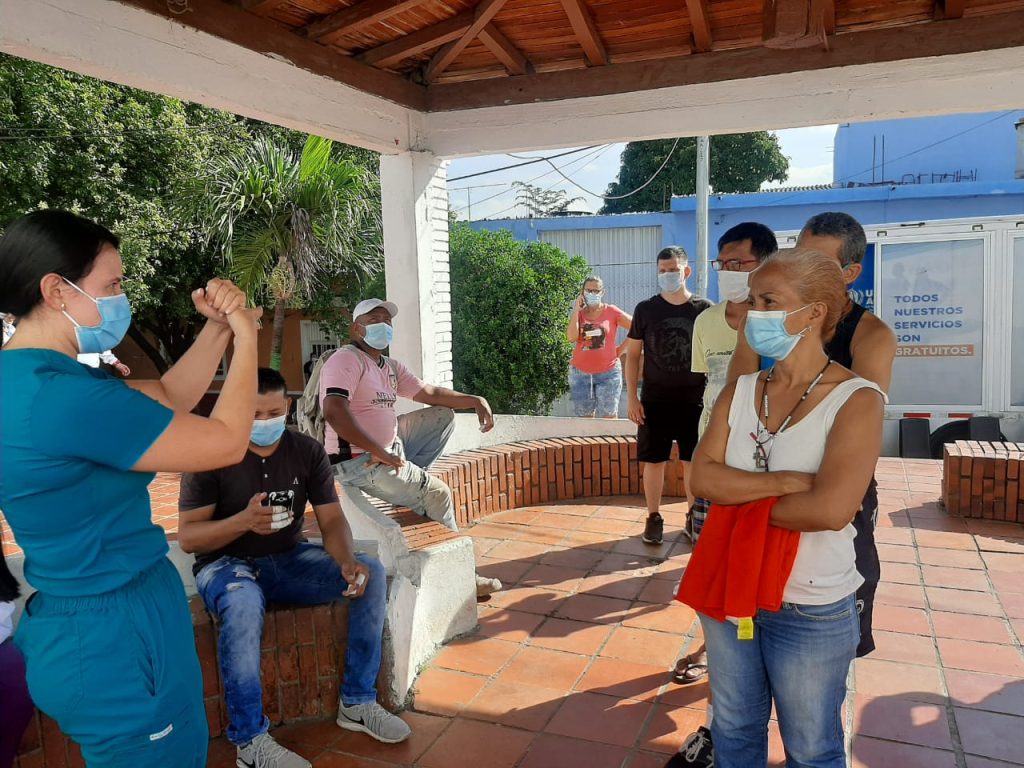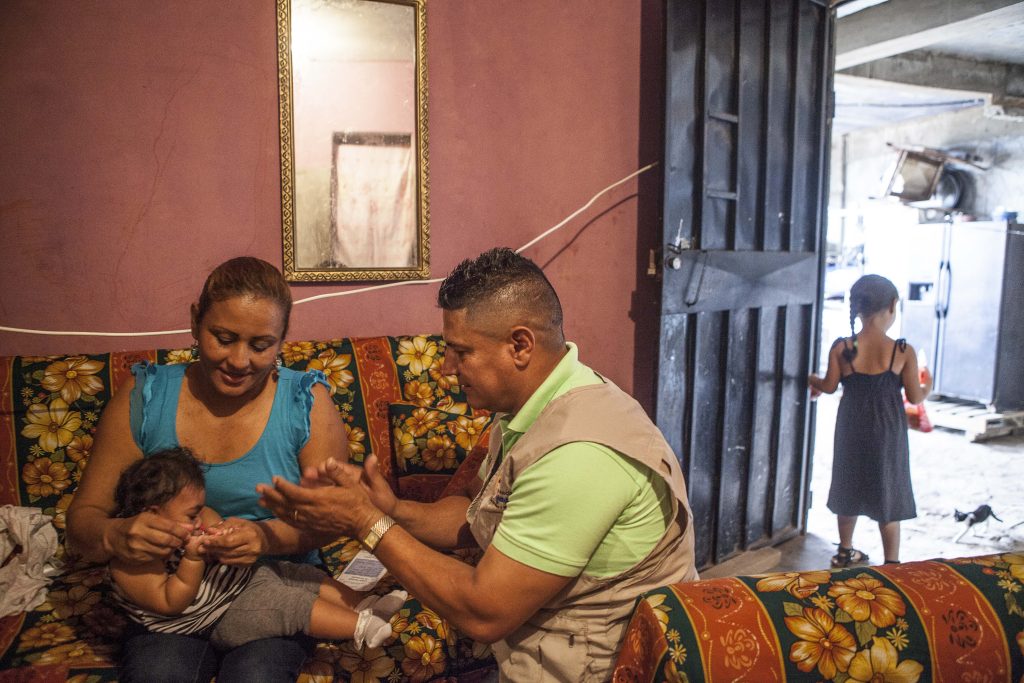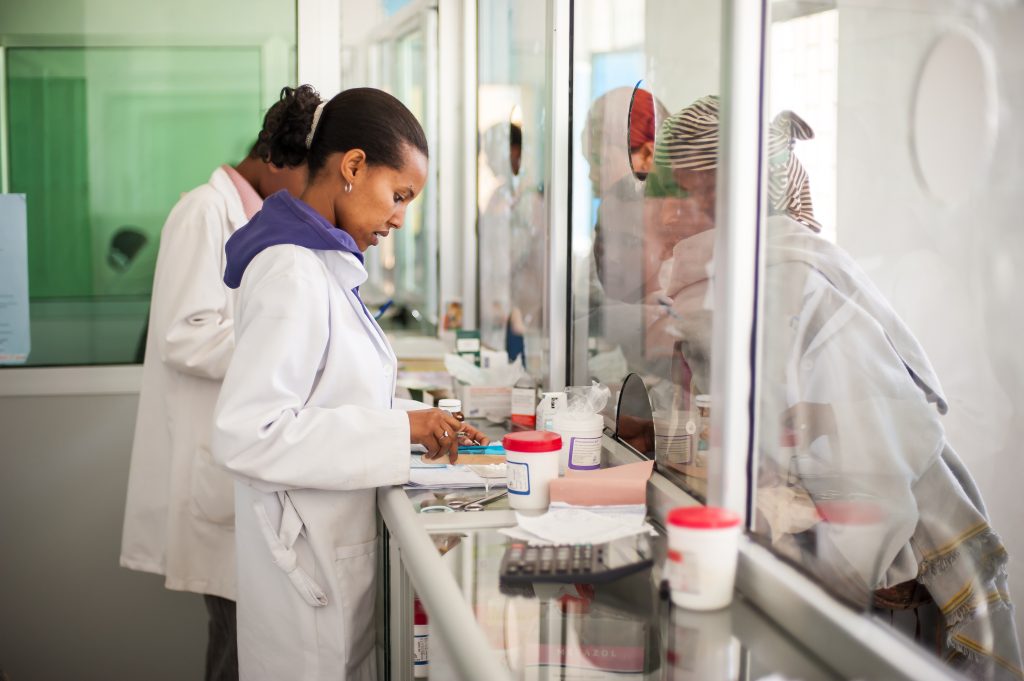2022 USAID Health Systems Strengthening Case Competition
The USAID Health System Strengthening Case Competition, supported by the Accelerator, is an opportunity for USAID staff and partners working on health system strengthening (HSS) activities to showcase the work they are doing and the impact that their activities are having on health systems and health outcomes.
Using real-life examples, the Case Competition will allow us to learn what does and does not work when implementing, institutionalizing, and scaling up health system programs and approaches. These case submissions will help inform USAID and its partners’ ongoing work and will contribute to learning syntheses and dissemination under the USAID HSS Learning Agenda to strengthen the global HSS evidence base.
2022 Case Competition Winners Showcase
The Winners Showcase on October 25, 2022, featured presentations from the three winners of USAID’s 2022 Health Systems Strengthening Case Competition.
Participants asked questions of our winning authors and engaged in a facilitated discussion about the impact of systems-thinking approaches on health system outcomes and how to sustain and scale up these approaches. Watch the recording below and view the results of Menti audience polls here.
2022 Case Competition Winners
NOTE: The Case Competition Winners are not presented in any particular order.
Strengthening Health Systems Response to Health Emergencies in Colombia

Authors
- Miguel Angel Pulido, Chief of Party, Local Health System Sustainability Project (LHSS) Project, Colombia Activity
- Esmily Ruiz Varón, Emergencies response lead, LHSS, Colombia Activity
- Jacqueline Acosta de la Hoz, Emergencies response specialist, LHSS, Colombia Activity
- Juanita Corral, Emergencies response specialist, LHSS, Colombia Activity
- Camila Franco Restrepo, Research and adaptive management lead, LHSS, Colombia Activity
- Jazmín Duque, Quality Advisor, LHSS, Colombia Activity
- Julie Collins, Project Management Officer, LHSS
- Kimberly Jimenez, Assistant for the emergencies response team, LHSS, Colombia Activity.
Contributors
- Alejandro Diaz, Project Management Specialist – Health Venezuela Response and Integration Office USAID/Colombia
Institutionalizing Evidence-based, Responsive Care for Women and Children Affected by Zika

Authors
- Lani Marquez, University Research Co., LLC (URC)
- Victor Boguslavsky, University Research Co., LLC (URC)
Contributors
- Ms. Lisa Maniscalco, the USAID ASSIST Project AOR
- Jorge Hermida (Regional Team Lead and Director of the Care and Support Collaborative)
- Miguel Hinojosa (Regional Coordinator for the Care and Support Collaborative)
- Cecilia Villaman (Country Director) and Dr. Digna López (Country Coordinator for the Care and Support Collaborative), Dominican Republic
- María José Escalante (Country Director) and Dr. José Corral (Country Coordinator for the Care and Support Collaborative), Ecuador
- Guadalupe Razeghi (Country Director) and Dr. María Magdalena Martínez (Country Coordinator for the Care and Support Collaborative), El Salvador
- Roberto Aldana (Country Director) and Dr. Iván de León (Country Coordinator for the Care and Support Collaborative), Guatemala
- Norma Aly (Country Director) and Ms. María Elena Banegas (Country Coordinator for the Care and Support Collaborative), Honduras
- Ivonne Gómez (Country Director) and Dr. Indira Moreno (Country Coordinator for the Care and Support Collaborative), Nicaragua
- Graciela Ávila (Country Director) and Dr. Patricia Misiego (Country Coordinator for the Care and Support Collaborative), Paraguay
- Christian Requena (Country Director), Peru
Auditable Pharmaceutical Transactions and Services (APTS)—Systems Approach for Sustainably Improving Pharmaceutical Management in Ethiopia

Authors
- Hailu Tadeg – USAID Medicines, Technologies, and Pharmaceutical Services (MTaPS) Program, Ethiopia
- Gabriel Swinth – MTaPS, Arlington VA, USA
Contributors
- Tamara Hafner – MTaPS, Arlington VA, USA
- Niranjan Konduri – MTaPS, Arlington VA, USA
Case Competition Information
- Closing the Gap in COVID-19 Vaccination Uptake in the Dominican Republic
- Comprehensive Rehabilitation Strategy in Primary Healthcare, Colombia 2018-2022
- From Fragmented to Coordinated: How Operationalizing a Province-Wide Referral System Improved Local Health Governance in the Province of Batangas, Philippines
- Implementation Research in Guinea
- Improving Civic Engagement and Advocacy for Timor-Leste Health Systems Strengthening Through REBAS-TL
- Improving TB Case Detection through High-Quality Health Systems Approach
- Integrating e-Diagnostic Approach (IeDA)
- Organizational Capacity Development Strategy
- Physical and Mental Rehabilitation Services
- Rapid Feedback MERL/Mali
- Sokoto State Cadre Conversion Initiative (Nigeria)
- Strategic Health Service Purchasing for Integrated Primary Care
- Strengthening District Health Planning
- Strengthening Interoperable Data Systems for Health Security in Indonesia
- Strengthening Laboratory Diagnostic Capacity in Jordan
- Strengthening the Diagnostic Capacity of the National Laboratory System in Liberia
- Success in Togo in the Transition to New High Quality Antiretroviral Therapy (TLD)/ Succès au Togo dans la Transition vers la nouvelle thérapie antirétrovirale de haute qualité (TLD)
- The COVID-19 Battle: Fighting the Invisible Foe through Data Visualization and Utilization
- Ensuring Continuity of Essential Health Services during Health Emergency Response in Davao City
- Using Systems Thinking to Improve Health Workforce Efficiencies in Kyrgyzstan
- Use of Community Health Workers to Improve Access to Health Services in Malawi
USAID-funded or closely collaborating projects. The Accelerator will accept up to 30 complete submissions.
- Learning Question 1: What are the contributions of systems thinking approaches and tools to changes in health system outcomes? How do systems thinking approaches affect health system outcomes?
- Learning Question 2: What conditions or factors successfully facilitate the institutionalization and/or implementation at scale of good practices that improve health system outcomes, and why? What are lessons learned regarding planning for sustainability and achieving results at scale?
- You will submit a poster highlighting an activity relevant to one of the two themes above. In the poster, you will be asked to provide a summary of:
- The context in which the activity takes place and what challenge(s) prompted you to apply a systems thinking approach (Q1), or to scale up or institutionalize practices that improve health system outcomes (Q2).
- A description of the activity
- What components of the health system have your activity impacted? (Refer to the USAID Vision for Health Strengthening 2030)
- Evidence of the impact on HSS strategic outcomes (financial protection, essential services, population coverage, and responsiveness) and health system outcomes (equity, quality, and resource optimization). In light of COVID, how this activity has contributed to health system resiliency.
- Factors that enabled your approach, challenges that impacted your approach, and lessons you learned through this activity
- Submissions must adhere to the poster size (120cm X 80cm) and font sizes (Title: Size 138, Subtitles: Size 60, Text: Size 14) in the templates:
Completed posters should be submitted by email to lewald@r4d.org. Please note whether your project is funded by USAID or a USAID partner.
- Entries will be scored by two judges from the Accelerator. Judging criteria will include the degree to which the activity:
- [25% of score] Clearly and with supporting evidence demonstrates the achievement of health systems outcomes (i.e., equity, quality, and resource optimization) that are clearly linked to the activity and/or demonstrates that scale-up or institutionalization was achieved or is in progress
- [25% of score] Uses systems thinking and tools and recognizes interactions between health systems “building blocks”
- [15% of score] Is intentional and has a clear theory of change
- [15% of score] Is locally-led
- [10% of score] Could potentially be adapted by others
- [10% of score] Clearly expresses main themes and ideas
- The panel’s scores will be averaged, and the top five entries will be submitted to a second panel including USAID reviewers. The second panel will select two winning entries.
- All qualifying entries will be showcased on this website. All qualifying entries will also be included in the forthcoming Evidence Gap Maps and other Learning Agenda products, contributing (with attribution) to the global evidence base.
- The winning entries will receive support from Accelerator staff to polish their case studies and present them to global and regional donors and partners at a high-profile USAID HSS Case Competition Winners’ Showcase event in Fall 2022. The winning entries will be highlighted and receive additional publicity on social media.
General
What is the purpose of the USAID Case Competition?
- To allow USAID, country implementers, and global/regional stakeholders to learn what does and does not work when implementing, institutionalizing, and scaling up HSS activities and approaches in real-life examples.
- This competition also raises the global visibility of promising health systems approaches.
Do cases have to represent only USAID-funded work?
The specific activity must be connected to the USAID, such as through funding, collaboration, or partnership.
In what languages can cases be submitted?
We can process and display cases in English or French.
Can I edit my entry once it has been submitted?
Due to the limited number of submissions that the organizers are able to receive, we are unable to accept any updates to your entry after your initial submission.
Eligibility/Submission
Are there limitations on when the case took place?
There are no time limits or restrictions.
Can we submit entries from U.S. government activities aside from USAID?
While the activity can be connected to other U.S. government activities, it must also be connected to USAID in some way.
What does “systems thinking” mean and how can we apply it to health?
Systems thinking is a set of analytic approaches and associated tools that seek to understand how systems function, evolve, behave, and interact with their environments and influence each other. Systems thinking can help us to understand the complexity of health systems by looking at them in terms of wholes and relationships, rather than as individual parts.
USAID defines health system strengthening as the strategies, responses, and activities that are designed to sustainably improve country health system performance by improving equity, quality, and resource optimization. These priority outcomes are defined as:
- Equity: An equitable health system affords every individual a fair opportunity to attain their highest level of health regardless of social or demographic factors, with particular emphasis on underserved, socially excluded, and vulnerable populations.
- Quality: A quality health system is responsive to patient and population needs and utilizes data-informed, continuous process improvement to consistently provide safe, effective, trusted, and equitable health care and medical products to improve and maintain health outcomes for all people.
- Resource Optimization: Resource optimization ensures that partner-country health systems adopt sustainable approaches to mobilize and use their various resources efficiently, effectively, and transparently to meet population health needs, where efficiency is determined both by the product derived from a given set of resources and the benefit obtained from their allocation.
Examples of activities that demonstrate systems thinking may include:
- Developing and implementing a national community health policy that recruits, trains, finances, and/or supports oversight of community health workers to increase people’s access to health services and improve equity, aligned with national health system human resource policies.
- Developing and rolling out an integrated, interoperable electronic health information management system that is a local adaptation of a global good and supports local digital systems governance capacity.
- Conducting implementation research to support the implementation and scale-up of a budgeting tool that helps health managers better forecast needs and budget resources across health programs.
Case Competition Judges
Thomas Bossert
Thomas J. Bossert is a senior lecturer and the director of the International Health Systems Program of the Harvard T. H. Chan School of Public Health. He has many years of experience in international health in Latin America and the Caribbean, Africa, Asia, and Central and Eastern Europe. His specialties include health reform, decentralization, sustainability, and implementation science, social capital, policy analysis, organizational and institutional analysis, human resources policy, public/private relations, community development, and project design and evaluation.
Dr. Bossert earned his AB from the School of Public and International Affairs (formerly Woodrow Wilson School) at Princeton University and MA and PhD in political science from the University of Wisconsin, Madison. He is fluent in Spanish and has a working knowledge of French.
Leizel Lagrada-Rombaua
Dr. Leizel Lagrada-Rombaua is an independent consultant working with global organizations, development partners and Philippine government agencies on health financing reforms, governance in health, and quality assurance. She had been a part of the Joint Learning Network for Universal Health Coverage (JLN) for seven years, first as country-representative and member of its steering group and recently in a technical support role for its quality assurance and governance structure. She worked as head executive staff (2010-2015) and concurrently as group vice president at the Philippine Health Insurance Corporation (PhilHealth) with a prior appointment as senior manager for the accreditation department and standards and monitoring department. She led the development of the implementing guidelines for the so-called PCB1 (primary care benefit package 1) and its expanded version, termed as TSEKAP – governing policies on the expanded coverage of the primary care benefit package (Tamang Serbisyo sa Kalusugan ng Pamilya).
Dr. Lagrada-Rombaua started as a municipal health officer in Palawan, Philippines (1997–2001) administering health services as a community physician and a rural health advocate. She worked at the Department of Health (2001–2010) as a medical officer and later as division chief in health policy and planning. Her involvement in the JLN enabled her to learn from and share with peers policy-relevant experiences from low- and middle-income countries like the Philippines that are pursuing similar UHC-related reforms.
Kamaliah Noh
Dr. Kamaliah Mohamad Noh is a technical expert in primary health care operational policy development. She has 25 years of experience at various levels of the public primary health care delivery system, at the district implementation level, the state policy level, and heading the primary health care section of the Ministry of Health, Malaysia. She took up an academic appointment at the University of Cyberjaya for 4 ½ years, teaching public health and community medicine. She has shared Malaysia’s experience in implementing national health policies to attain public health goals at the regional ASEAN and global levels. As an independent consultant, she is involved with R4D’s work on the Joint Learning Network for Universal Health Coverage’s primary health care technical initiative and the PHC Financing and Payment collaborative.
Dr. Kamaliah is a Fellow of the Public Health Chapter of the Academy of Medicine Malaysia, holds an MPH from the University of Philippines Manila, a postgraduate diploma in dermatology from the University of London, and a Bachelor of Medicine and Surgery from the University of Alexandria.
Helen Saxenian
Helen Saxenian is a health economist who has led many projects at Results for Development, primarily focused on immunization. She has been an independent consultant for 18 years, and before that worked for 20 years at the World Bank, in both technical and managerial capacities, primarily in the health sector. She has worked on broad health sector reform, HIV/AIDS, health insurance reform, provider reimbursement, human resources for health, health public expenditure reviews, pharmaceutical policies, new drug, and vaccine development, and women’s reproductive health. She is the author of many World Bank sector and policy reports, and external publications.
Ms. Saxenian has a Ph.D. in applied economics from Stanford University and a B.A. in economics from U.C. Berkeley.




